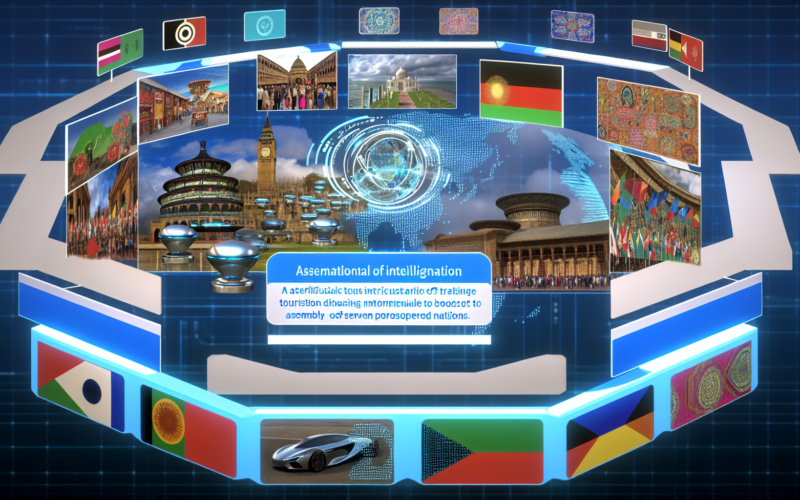AI can enhance G7 tourism by boosting sustainability and visitor experiences. Key: data security, workforce training, and collaboration. #AI #Tourism #Sustainability
- Introduction
- Background and Context
- Main Explanation
- Challenges and Opportunities
- Future Outlook
- Conclusion
Introduction
Artificial Intelligence (AI) is transforming industries across the globe, and tourism is no exception. The recent policy paper by the Organisation for Economic Co-operation and Development (OECD) underscores AI’s potential to reshape tourism in the Group of Seven (G7) countries. Comprising Canada, France, Germany, Italy, Japan, the United Kingdom, and the United States, the G7 stands to benefit significantly from AI tools that enhance sustainability, improve visitor experiences, and streamline operations. However, these opportunities come with inherent risks that need careful management.
The OECD’s December 18th report titled “Artificial Intelligence and Tourism” reveals the growing importance of AI in fostering innovation and sustainability within the tourism sector. By examining existing applications and potential benefits, the paper paints a picture of a future where AI not only enriches tourist experiences but also supports sustainable practices. As AI tools become more integral in tourism, they offer solutions such as resource management, waste reduction, and workforce optimization. Yet, the journey to fully integrate AI into tourism is fraught with challenges related to data quality, security, and environmental impacts.
This article delves into the transformative impact of AI on G7 tourism, exploring its potential benefits, the challenges it presents, and the future outlook for this dynamic intersection of technology and travel. Through this exploration, we aim to provide a comprehensive understanding of how AI is poised to redefine the tourism landscape and what stakeholders can do to harness its full potential while mitigating associated risks.
Background and Context
The tourism industry has always been a significant contributor to the global economy, providing jobs and fostering cultural exchange. In the G7 countries, tourism plays a crucial role in economic growth and development. However, the ever-increasing number of tourists poses challenges such as overcrowding, environmental degradation, and resource strain. This is where AI comes in as a game-changer.
Historically, the tourism sector has relied on traditional methods to address these challenges. However, the digital revolution has opened new avenues for innovation. AI, with its ability to process vast amounts of data and learn from patterns, offers unprecedented opportunities to enhance efficiency and sustainability in tourism. From predicting tourist flows to personalizing visitor experiences, AI is set to revolutionize how the tourism industry operates.
The OECD’s policy paper provides a comprehensive analysis of AI applications in tourism, highlighting key developments and trends. For instance, AI-driven chatbots are increasingly used for customer service, offering 24/7 assistance to travelers. Similarly, AI-powered data analytics helps destinations manage tourist numbers by predicting peak times and optimizing resources accordingly. These advancements signify a shift towards a more data-driven, efficient, and personalized approach to tourism.
Main Explanation
AI-Driven Visitor Experience Enhancement
AI is revolutionizing the way tourists experience their destinations. From personalized recommendations to virtual reality tours, AI tools are enhancing visitor engagement and satisfaction. For example, AI-powered apps can offer personalized itineraries based on individual preferences, ensuring tourists make the most of their visit. Additionally, AI-driven translation tools help overcome language barriers, making travel more accessible and enjoyable.
Sustainability Through AI
One of the most significant benefits of AI in tourism is its potential to promote sustainability. AI tools can optimize resource use, reduce waste, and manage tourist flows more efficiently. For instance, machine learning algorithms can predict tourist patterns and suggest alternative routes or times to visit popular attractions, reducing overcrowding and minimizing environmental impact. Furthermore, AI can facilitate the allocation of skilled workforce to areas where they are most needed, ensuring optimal resource utilization.
Automation of Internal Processes
AI is streamlining internal processes within the tourism industry, leading to increased efficiency and cost savings. Automated systems for booking, customer service, and data management reduce the need for manual intervention, allowing staff to focus on more strategic tasks. For instance, AI-driven chatbots handle routine inquiries, freeing up human agents to address complex issues. Moreover, AI-powered data analytics provides valuable insights into customer behavior, helping businesses tailor their offerings to meet evolving demands.
Challenges of AI Adoption in Tourism
While the benefits of AI are substantial, several challenges need to be addressed. Data quality and security are paramount concerns, as inaccurate or compromised data can lead to flawed insights and decisions. Additionally, the environmental impact of AI, particularly in terms of energy consumption, cannot be overlooked. It is crucial for stakeholders to implement robust data protection measures and explore sustainable AI solutions to mitigate these risks.
AI Policy-Making and Collaboration
The OECD emphasizes the importance of international collaboration in AI policy-making. By sharing knowledge and best practices, G7 countries can develop effective legal and regulatory frameworks that support AI’s integration into tourism. Policymakers must also consider the impact of AI on employment, ensuring that workers are equipped with the necessary skills through training and education programs.
Challenges and Opportunities
The integration of AI in tourism presents both challenges and opportunities. On the one hand, AI offers solutions to pressing issues such as resource management and customer engagement. On the other hand, the adoption of AI technologies raises concerns about data privacy, security, and potential job displacement.
To leverage AI’s benefits while mitigating its risks, stakeholders must adopt a proactive approach. This includes investing in AI research and development, fostering international collaboration, and implementing robust data protection measures. By doing so, the tourism industry can harness AI’s full potential to drive innovation, sustainability, and growth.
Future Outlook
Looking ahead, AI is poised to play an increasingly pivotal role in shaping the future of tourism. As technology continues to evolve, AI tools will become more sophisticated, offering even greater capabilities for enhancing visitor experiences and promoting sustainability. The future of tourism lies in harnessing AI to create a more efficient, personalized, and environmentally-friendly industry.
With ongoing advancements in AI technology, the tourism sector can expect to see new applications and innovations that redefine the travel experience. From AI-driven facial recognition for seamless check-ins to predictive analytics for personalized marketing, the possibilities are endless. As stakeholders continue to embrace AI, the tourism industry is set to undergo a profound transformation, paving the way for a more sustainable and inclusive future.
Conclusion
In conclusion, AI is revolutionizing the tourism industry in G7 countries, offering a wealth of opportunities to enhance visitor experiences, promote sustainability, and streamline operations. However, these benefits come with challenges that require careful management and international collaboration. By adopting a proactive approach to AI integration, the tourism sector can leverage technology to drive innovation, growth, and sustainability.
As we look to the future, the potential of AI in tourism is limitless. By embracing AI-driven solutions, stakeholders can create a more efficient, personalized, and environmentally-friendly tourism industry that meets the evolving needs of travelers and destinations alike. The time is now for the tourism industry to harness the power of AI and shape a brighter, more sustainable future for all.











